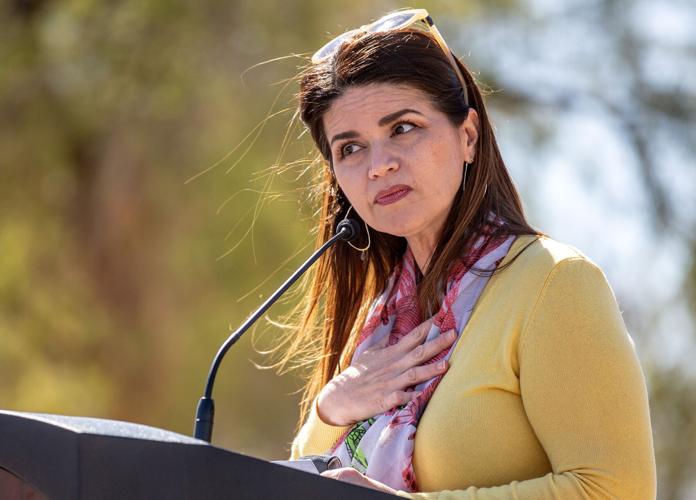When you listen to some Tucson officials talk about the new minimum wage initiative, you hear echoes of a recent debate.
They say they support the spirit of the initiative, but they struggle with the details of it.
That might sound familiar.
It brings me back to 2019, when some of the same people behind this year’s minimum wage effort were supporting an initiative to make Tucson a sanctuary city. Democratic council members and candidates for mayor opposed the sanctuary city initiative while proclaiming their support for an immigrant-friendly Tucson.
They feared the city would lose state-shared revenue if the initiative passed, and their opposition helped torpedo any hope the sanctuary initiative had. Voters rejected it resoundingly, with 71% voting no.
This year the quibbles go something like this:
“I equate this to like a bull in a china shop. I’d much rather be threading the needle and having more of a collaborative process than being in a situation where we’re being challenged to say, ‘Do you believe in this or not?’” — Councilman Paul Cunningham.
“We’re having trouble paving roads. We don’t have time to chase down Uber drivers to be sure they’re getting paid right” — Councilman Steve Kozachik.
“They’re making a huge ask of creating a new department, creating a new bureaucracy and even creating a new court for employees to bring cases” — Mayor Regina Romero, on the “Tipping Point” radio show hosted by Zach Yentzer.
So there are quibbles, major quibbles, with the language of the ordinances. Among the others:
The initiative allows “interested parties” in the nonprofit sector, not just the affected employees, to file complaints against employers.
The initiative attempts to apply the minimum wage law to independent contractors, such as ride-share drivers.
City wage investigators would be given free access to the pay and time records of employees and independent contractors.
The minimum wage would rise too slowly to $15, reaching it on Jan. 1, 2025.
Ugh, even the progressives are having a hard time swallowing some of the language of the initiative.
But the main difference between this and the sanctuary city initiative is that many of the same officials are swallowing hard and endorsing it despite their reservations.
Mayor Romero, who was on the fence as of her interview last week, said in a statement Tuesday that she will support the initiative.
“I will be voting ‘yes’ on Proposition 206 for one simple reason — anybody who works full time should make a living wage that helps support themselves and their families. This is why I led the charge to pass a $15/hr minimum wage for all workers employed by the City of Tucson.
“With Congress failing to raise the federal minimum wage, this leaves no other choice but to act locally. I also encourage the Pima County Board of Supervisors to raise the minimum wage to $15/hr countywide if Tucson voters pass Prop 206 in order to benefit workers and their families throughout the entire region.”
When I talked with him Tuesday, Cunningham sounded pained by the position the initiative puts him in. He worries about the inequity in pay standards between tipped workers in the front of restaurants versus wage-only workers in the back. He also suspects the state will sue the city as it is suing Flagstaff over the difference in wages paid to state workers and contractors in Flagstaff.
“It’s not perfect, but it’s what we got,” he said. “It’s being put to the voters, and I’m not going to oppose a minimum wage because of a couple of nuanced issues.”
And Kozachik, who endorsed the initiative during the primary campaign, describes his position now as “Yes with an asterisk.”
“The dollars don’t bother me,” he said. “There are some pieces with the way this proposition is framed that do bother me.”
The requirement in the initiative that the city set up its own department of labor standards is one of those pieces. But again, he is guardedly supporting the initiative.
This conditional support may not be what the Community Food Bank of Southern Arizona had in mind when it poured $50,000 into the campaign in February to get the initiative on the ballot. That unprecedented political contribution is by far the bulk of the financial support for the Fight for $15 campaign.
Michael McDonald, CEO of the food bank, said the political landscape is different than when a task force of the Southern Arizona Prosperity Alliance started entertaining the idea almost two years ago. Now, for example, there may be three votes on the Pima County Board of Supervisors to support a countywide minimum wage.
Supervisors Adelita Grijalva, Matt Heinz, and Rex Scott — a majority of the board — have all endorsed the Tucson ordinance. But McDonald and the initiative’s other supporters are pressing ahead with city voters.
“If not now, following a major global pandemic and major economic meltdown, if we don’t have the resolve as a community to do the right thing, when will we ever have it?” McDonald asked.
Although there is likely to be a campaign against the initiative, this timing and the topic likely give the minimum wage initiative better prospects than the sanctuary initiative.
It’s the difference between conditional opposition and conditional support.







